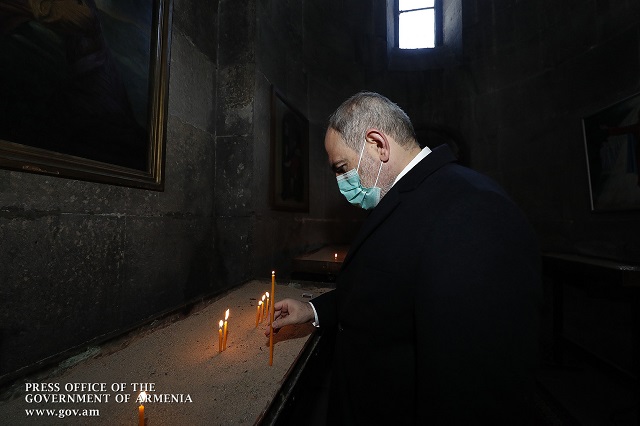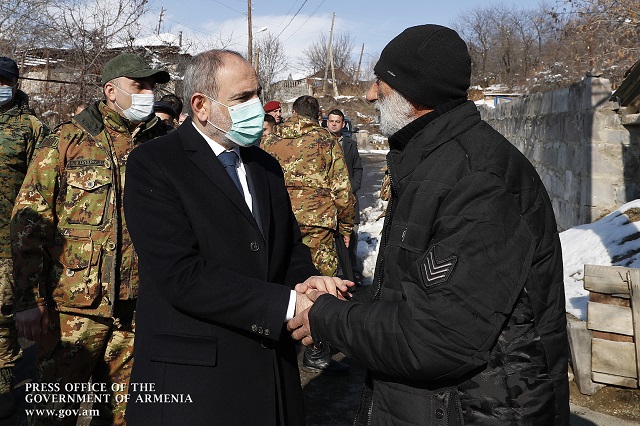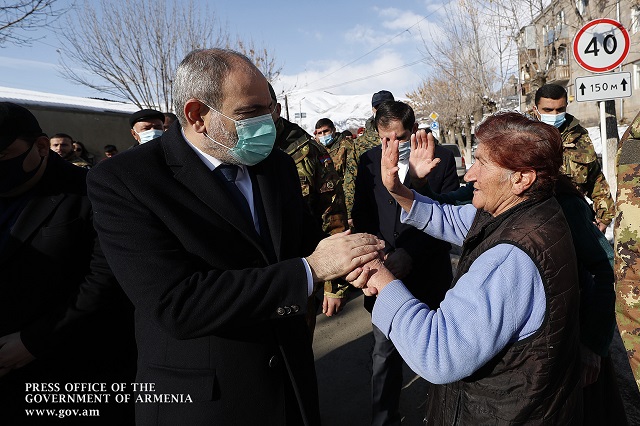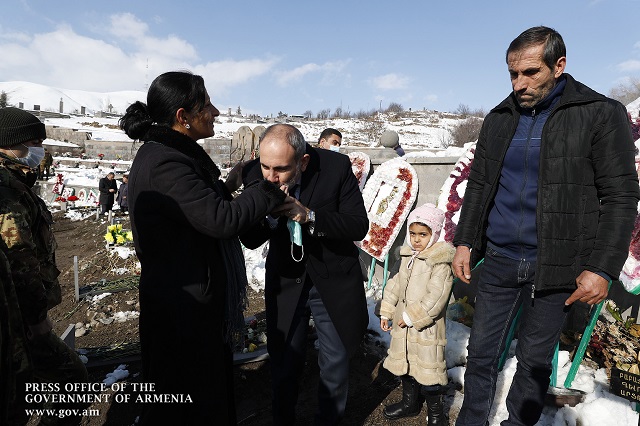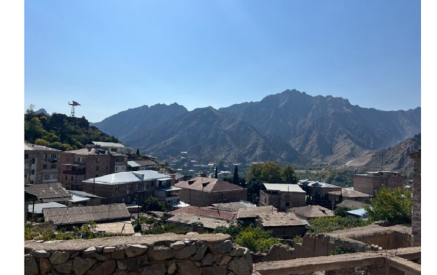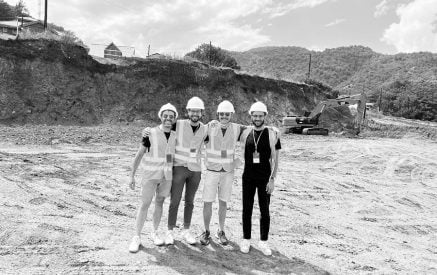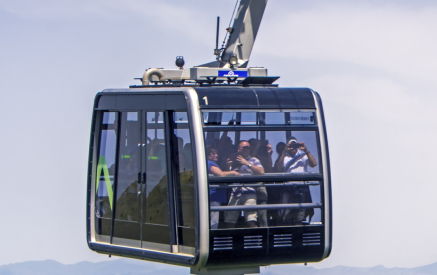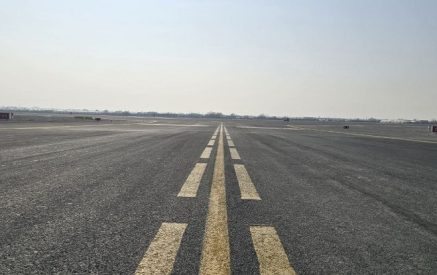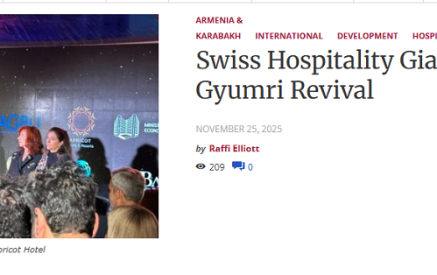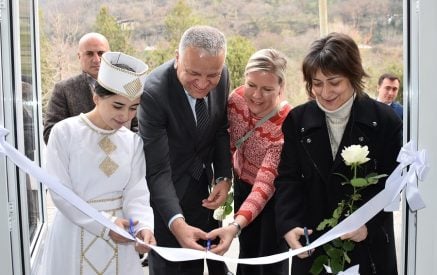Prime Minister Nikol Pashinyan today traveled to Syunik Marz of Armenia. The Premier first called at Sarnakunk community. The Head of Government talked to the locals, took note of their concerns about the ongoing demarcation activities in Syunik. Nikol Pashinyan answered the questions of interest to community residents.
Nikol Pashinyan spoke about the 6 Armenian servicemen who went missing for 70 days in the territories that came under Azerbaijan’s control and who returned to the homeland yesterday. Their return was a bright spot in these difficult days. “Today is a day of mourning, and we honor the memory of our fallen soldiers during three days of mourning. I want us to be worthy of our fallen soldiers. Now we are in a post-shock state, and we must do everything to stabilize the situation, repatriate our POWs and find the missing persons. Yesterday we witnessed an important event: we managed to repatriate a group of 6 servicemen who had been hiding in the forest. Although today is a day of mourning, this event changed the mood. We are all looking for a bright spot around which to build our optimism. The first group of repatriated war prisoners changed the mood to some extent.”
The Prime Minister underscored that we have a heroic army, and there cannot be two opinions about it, which does not mean at all that there were no problems. “This does not mean that there was no soldier, officer or a general who fell short of a specific task. But this should not affect our assessment. We must consistently strengthen our collective self-confidence and optimism, we must build our country – Armenia and Artsakh – in a new way,” the Prime Minister stressed.
Nikol Pashinyan left Sarnakunq for Sisian community. The Prime Minister called at the Municipal Pantheon and paid tribute to the memory of our heroes who perished defending the Motherland in the Artsakh war. Nikol Pashinyan knelt down and laid flowers at their graves.
Read also
Then the Prime Minister met with the locals who had gathered in the central square of Sisian. Addressing the residents of Sisian, Nikol Pashinyan said: “In fact, the purpose of my visit is to communicate with the residents of Syunik. I would like to thank Sisian for understanding and for such a warm welcome. The most important thing I would like to say is that I have come to explain what is happening on Syunik’s borders. Of course, we need to analyze in all detail what happened. But first of all, before starting a substantive discussion, I suggest honoring the memory of our martyrs with a minute of silence and agree that from this moment there will be no applause, no chants, nothing like that. There is something important I want you to hear.”
The Premier joined those present to honor the memory of fallen Armenian soldiers with a minute of silence. Touching on the situation around Syunik and the rumors being circulated on this matter, the he said: “Today there is a lot of talk that what is happening on the borders of Syunik is just nothing short of surrendering it to Azerbaijan, that the security of Syunik is jeopardized. The reality is just the opposite. Because, as I said in my address, the point is that by deploying our border troops along Armenia’s state borders, we are actually enhancing our security level because the borders of the Republic of Armenia thereby become an integral part of the security system in which we are incorporated.
Now the next question may arise. We are asked why our troops are going to be stationed precisely on that border line: Who made that decision and on what legal basis is the border determined? This very question is also asked by individuals who in 2010 were members of the National Assembly, ministers, and held various public positions. The point is that today’s borders, the description of the administrative borders of communities are determined by the law of the Republic of Armenia “On Administrative-Territorial Division,” which was adopted in 2010. The Law describes the administrative boundaries of Nerqin Khndzoresk and Tegh communities as a border with Azerbaijan. That was in 2010. The government approved this law which gives the description of our problematic borders.
Today those who used to be cabinet members or National Assembly members in those years are asking us why we recognized these borders. But the law has come into force. Why did they not say in those days that this was the territory of the Republic of Artsakh, why did not they say? I want you all, the residents of Syunik to have a clear idea of what is going on. I reiterate that this is being done to improve the security level of Syunik.”
Coming to the issue of security guarantees, Nikol Pashinyan said the following: “Security is guaranteed insofar as our security system works. Today many keep asking us why the CSTO did not intervene during the Karabakh war. For the same reason: our own law stipulates that here is our border. Beyond Tegh village is the Republic of Azerbaijan. This law was passed in 2010 by the Parliament. The relevant bill was introduced by the government in office in 2010.
The CSTO tells us that this is our border, since we have described it so. How can we intervene outside your borders? I have received many assurances, and we have agreements to the effect that if, God forbid, hostilities are unleashed inside our borders, then a completely different regime should operate.
The Artsakh issue is a completely different problem, and it is an internationally recognized problem. We are told that if we stand on this border, then we close the Karabakh issue, and if this is true, then you yourself closed the Karabakh issue with the law adopted in 2010.
You see, the nuance is as follows: those who were ministers and deputies in 2010 tell us if we recognize that line as a border on the Shurnukh, Tegh, Goris or Kapan section, we are thereby closing the Artsakh issue. If so, then you already closed the question in 2010. If the recognition of this border is today deemed as an act of treason, then it was an even greater treason in 2010. You know who was deputy from this region in 2010, and you need to see how he voted. In any case, his faction voted in favor.”
Nikol Pashinyan also touched on the issue and reasons for road closures in some settlements in Syunik region. “My trip was planned beforehand. I had to visit Goris, Kapan, Meghri. To be honest, we did not carry out much organizational work in advance, but I see that so many people have gathered here. What is the most touching moment for me is that relatives of the fallen soldiers came over and are present here.
People there blocked the roads in the morning, and because the road was blocked, big traffic jams were formed. But I am asking a logical question: after all, why did they block the road? Now as I am meeting with you, I realize that the same situation would be in Goris, Kapan, Meghri, abd the same situation would be in Shurnukh, the same situation would be everywhere, because today people understand the situation much deeper. This is the point.
Sisian is the entrance to Syunik, I arrived today and talked with the residents of Syunik. But I believe that today one cannot give in to such provocations. There are people who want to provoke clashes, there are people who want to provoke clashes with the police. We will not succumb to their provocations. But I suggest a deal to those blocking the road. I feel that when I go to Goris, we will have the same unorganized meeting in Goris, we will have the same unorganized meeting in Kapan, we will have the same unorganized meeting in Meghri; people will come around to express their support.
The road was blocked to prevent us from holding meetings like this. If this is not the case, then I suggest refraining from provocations; we will not resort to violence, we will not do anything. Open the road and we will go to Goris to see what is going on there; what people are saying or thinking. Of course, people may ask very difficult questions for us. Either you are asking challenging questions. And yes, I accept our responsibility that we must answer these questions. I also accept that there are questions that we do not yet have an answer to. But the answers to these questions are very important.
And the situation is as follows: yes, today we have a problem with missing people. The relatives of the missing came up to me; yes, we are guilty before these people. Yes, we are to blame. But I want to assure you that everything possible is being done. Yesterday a miracle happened when 6 of our soldiers who had been hiding in the woods for 70 days were found and evacuated. Work in this direction has been going on for a long time now, but due to a number of problems it yielded specific results for the first time yesterday.
I have probably discussed this issue dozens of times with the President of the Russian Federation. We discussed it with the commanders of Russian peacekeepers, and they, in turn, discussed it with the representatives of Azerbaijan. The parents of missing soldiers even thought that it was just make-believe, and we did noting in fact. They had the right to think so, because there were no results. But yesterday came like a miracle, and I want to thank President Vladimir Putin for making this effort at last.
The biggest challenge is that the area is too large, and we do not know exactly where our guys are hiding. Sometimes they were called out with loudspeakers in Russian and Armenian and told that a truce had been established and they could go out, but there was no answer. And we think that perhaps there was no response because our soldiers did not trust: speaking Armenian does not mean anything, because the Azeris, too, can speak Armenian, moreover Russian. Then we decided that the statement should be made by a person familiar to them, so that they could recognize his voice, and success finally came yesterday.
Once again I thank everyone who helped make this miracle. I will say that all the guys are exhausted indeed, but their lives are out of danger. And according to preliminary data, as far as I was told, no one is facing the threat of disability. Those. guys will return to full life, and this is really symbolic.
Dear people,
Thank you, because every time I come to Sisian, I feel your support. And I have a lot to do to earn your support. In fact, I am guilty of many things to you, and I hope to be worthy of your trust. The general mood is essentially the same all over the country.
Again, why did they block the road? Because they knew that an unorganized meeting like this might be held in Goris, Kapan and Meghri. Especially on this mourning day I would like to reiterate that we will not give in to provocations. Meghri, Kapan or Goris will not run away.
Today we arrived in Syunik; we met with the residents of Syunik; we paid tribute and visited the graves of Syunik-born heroes, and this process will continue. We will not succumb to provocations.
I said that I was coming to look into the eyes of Syunik residents. I arrived and looked into your eyes. I know I am to blame on many issues. We have to work hard in order to earn your trust, be worthy of you, be worthy of your trust. I say that all of you, the citizens of Armenia, deserve much more. Unfortunately, not a single government in Armenia, including ours, has so far been able to lead the country to what you really deserve. I want to apologize for this not only on behalf of our government, but also on behalf of all previous governments.
But most importantly, my biggest challenge is that I got this status from you, you are the owner of this status, and it is my responsibility to make sure that you remain the owners of this status, so that the past could never be back again with the devastating practice of election frauds and intimidation; when the authorities did whatever they wanted and promoted whoever they wanted.”
INFORMATION AND PUBLIC RELATIONS DEPARTMENT OF THE OFFICE OF THE PRIME-MINISTER OF THE REPUBLIC OF ARMENIA



















































